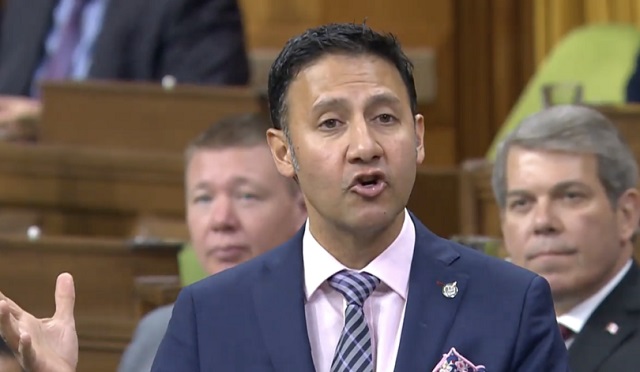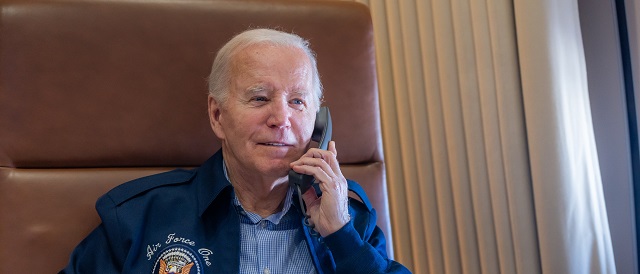Media
Trudeau’s ‘online harms’ legislation includes life imprisonment for ‘hate speech’

Justice Minister Arif Virani
From LifeSiteNews
While the government claims the bill is intended to protect kids, Conservative Party of Canada leader Pierre Poilievre said Liberals are looking for clever ways to enact internet censorship laws.
Details of new “online harms” legislation to regulate the internet have emerged, revealing that the bill could lead to more people jailed for life or fined $20,000 for posts that the government defines as “hate speech” based on gender, race, or other categories.
Bill C-63 is titled “An Act to enact the Online Harms Act, to amend the Criminal Code, the Canadian Human Rights Act and An Act respecting the mandatory reporting of Internet child pornography by persons who provide an Internet service and to make consequential and related amendments to other Acts.”
It was introduced by Justice Minister Arif Virani in the House of Commons today and passed its first reading in the afternoon.
The new bill will create the Online Harms Act and modify existing laws, amending the Criminal Code as well as the Canadian Human Rights Act, in what the Liberals under Prime Minister Justin Trudeau claim will target certain cases of internet content removal, notably those involving child sexual abuse and pornography.
According to the Trudeau government, Bill C-63 aims to protect kids from online harms and crack down on non-consensual deep-fake pornography involving children and will target seven types of online harms, such as hate speech, terrorist content, incitement to violence, the sharing of non-consensual intimate images, child exploitation, cyberbullying and inciting self-harm.
Virani had many times last year hinted a new Online Harms Act bill would be forthcoming.
While the Trudeau government claims the bill is being created to protect kids, Conservative Party of Canada (CPC) leader Pierre Poilievre said the federal government is looking for clever ways to enact internet censorship laws.
During a February 21, press conference, Poilievre said that Trudeau is looking to in effect criminalize speech with he does not like.
“What does Justin Trudeau mean when he says the word ‘hate speech?’ He means speech he hates,” Poilievre said.
Thus far, Poilievre has not commented on the full text of Bill C-63.
As part of the new bill, the Trudeau Liberals are looking to increase punishments for existing hate propaganda offenses in a substantial manner.
The Online Harms Act will also amend Canada’s Human Rights Act to put back in place a hate speech provision, specifically Section 13 of the Act, that the previous Conservative government under Stephen Harper had repealed in 2013 after it was found to have violated one’s freedom of expression.
The text of the bill, released Monday afternoon, reads that the Canadian Human Rights Act will be amended to add a section “13” to it.
This section reads, “It is a discriminatory practice to communicate or cause to be communicated hate speech by means of the Internet or any other means of telecommunication in a context in which the hate speech is likely to foment detestation or vilification of an individual or group of individuals on the basis of a prohibited ground of discrimination.”
“In this section, hate speech means the content of a communication that expresses detestation or vilification of an individual or group of individuals on the basis of a prohibited ground of discrimination,” the bill reads.
A “Clarification – hate speech” in the bill reads, “For greater certainty, the content of a communication does not express detestation or vilification, for the purposes of subsection (8), solely because it expresses disdain or dislike or it discredits, humiliates, hurts or offends.”
Earlier Monday, details of the bill were released to the media in a technical briefing.
“New standalone hate crime offence that would apply to every offence in the Criminal Code and in any other Act of Parliament, allowing penalties up to life imprisonment to denounce and deter this hateful conduct as a crime in itself,” the technical briefing reads.
“The maximum punishments for the four hate propaganda offences from 5 years to life imprisonment for advocating genocide and from 2 years to 5 years for the others when persecuted by way of indictment.”
For now, the law will affect all social media platforms as well as live-streamed video services, notably Meta and Google (YouTube).
Bill creates three ‘Digital Safety’ positions to enforce rules and let anyone file ‘complaints’
Bill C-63 mandates the creation of the Digital Safety Commission, a digital safety ombudsperson, and the Digital Safety Office.
The ombudsperson along with the other offices will be charged with dealing with public complaints regarding online content as well as put forth a regulatory function in a five-person panel “appointed by the government.” This panel will be charged with monitoring internet platform behaviors to hold people “accountable.”
Bill C-63 also includes text to amend Canada’s Criminal Code and Human Rights Act to define “hatred” as “Content that expresses detestation or vilification of an individual or group of individuals on the basis of a prohibited ground of discrimination, within the meaning of the Canadian Human Rights Act, and that, given the context in which it is communicated, is likely to foment detestation or vilification of an individual or group of individuals on the basis of such a prohibited ground. (contenu fomentant la haine).”
Most worryingly, the new bill will allow it so that anyone can file a complaint against another person with the Canadian Human Rights Commission for “posting hate speech online” that is deemed “discriminatory” against a wide range of so-called protected categories, notably gender, race, those, or other areas.
If a person is found guilty of violating the Human Rights Act by going against what the government deems to be hate speech, they face fines of $20,000 along with being mandated to take down any postings online, notably on social media.
Many aspects of Bill C-63 come from a lapsed bill from 2021.
In June 2021, then-Justice Minister David Lametti introduced Bill 36, “An Act to amend the Criminal Code and the Canadian Human Rights Act and to make related amendments to another Act (hate propaganda, hate crimes and hate speech).”
It was blasted as a controversial “hate speech” law that would give police the power to “do something” about online “hate.”
It was feared that it would target bloggers and social media users for speaking their minds.
Bill C-36 included text to amend Canada’s Criminal Code and Human Rights Act to define “hatred” as “the emotion that involves detestation or vilification and that is stronger than dislike or disdain (haine).”
If passed, the bill would theoretically allow a tribunal to judge anyone who has a complaint of online “hate” leveled against them, even if he has not committed a crime. If found guilty, the person would be in violation of the new law and could face fines of $70,000 as well as house arrest.
Two other Trudeau bills dealing with freedom as it relates to the internet have become law, the first being Bill C-11, or the Online Streaming Act, that mandates Canada’s broadcast regulator, the Canadian Radio-television and Telecommunications Commission (CRTC), oversee regulating online content on platforms such as YouTube and Netflix to ensure that such platforms are promoting content in accordance with a variety of its guidelines.
Trudeau’s other internet censorship law, the Online News Act, was passed by the Senate in June 2023.
The law mandates that Big Tech companies pay to publish Canadian content on their platforms. As a result, Meta, the parent company of Facebook and Instagram, blocked all access to news content in Canada. Google has promised to do the same rather than pay the fees laid out in the new legislation.
Critics of recent laws such as tech mogul Elon Musk have said it shows “Trudeau is trying to crush free speech in Canada.”
Censorship Industrial Complex
Internet censorship laws lead a majority of Canadians to believe free speech is threatened: poll

From LifeSiteNews
In light of the barrage of new internet censorship laws being passed or brought forth by the federal government of Prime Minister Justin Trudeau, a new survey revealed that the majority of Canadians feel their freedom of speech is under attack.
According to results from a Leger survey conducted April 26-28 that sampled responses from 1,610 Canadians, 57 percent think their freedom of speech is being threatened, with 36 percent not believing this to be true.
Not surprisingly, those with conservative voting intentions, about 76 percent, were the most likely to feel that their free speech is under attack, with 70 percent of the same group as well as those over 55, feeling that Canada is not as free as before.
The survey results also show that 62 percent of Canadians think it is “tougher to voice their opinion in their country, while 27% think it is easier.”
“Conservative voters (70%) and Canadians aged 55 or older (70%) are more likely to think that it is tougher now to express their opinion,” Leger noted in its survey.
Not surprisingly, Liberal voters were the most supportive of placing limits on free speech, with 64 percent agreeing with the following: “There should be limits on freedom of speech to ensure that things such as hate speech, speeches preaching a form of intolerance, or speeches against democracy be prevented from reaching the public.”
The survey also revealed that about one of four conservative voters believe that their views are not socially acceptable.
Sixty percent of conservative voters said that free speech should never be limited in any manner and that one should be able to express their opinions publicly without issue.
Regarding their reasons for free speech being under attack, 11 percent blamed politicians causing more hate, with eight percent saying “right-wing” extremists were to blame, with seven percent blaming woke-minded thinking as the issue. Twenty-nine percent of Canadians felt that a growing lack of respect is to blame, and 13 percent thought it is due to “a degradation of the moral fibre in the country.”
A bit concerningly, only six of 10 Canadians have confidence that the next federal election, scheduled for 2025, will be “free and fair,” with 29 percent saying outright they are “not confident.”
When it comes to internet censorship laws, the most recent one introduced in the House of Commons is a federal government bill that could lead to large fines or jail time for vaguely defined online “hate speech” infractions under Liberal Minster Attorney General Arif Virani’s Bill C-63, or Online Harms Act.
LifeSiteNews recently reported how well-known Canadian psychologist Jordan Peterson and Queen’s University law professor Bruce Pardy blasted Trudeau and his government over Bill C-63.
Peterson noted that in his view, Bill C-63 is “designed … to produce a more general regime for online policing.”
“To me, that’s what it looks like,” he said.
Two other Trudeau bills dealing with freedom on the internet have become law, the first being Bill C-11 or the Online Streaming Act that mandates Canada’s broadcast regulator, the Canadian Radio-television and Telecommunications Commission (CRTC), oversee regulating online content on platforms such as YouTube and Netflix to ensure that such platforms are promoting content in accordance with a variety of its guidelines.
Trudeau’s other internet censorship law, the Online News Act, was passed by the Senate in June 2023.
The law mandates that Big Tech companies pay to publish Canadian content on their platforms. As a result, Meta, the parent company of Facebook and Instagram, blocked all access to news content in Canada. Google has promised to do the same rather than pay the fees laid out in the new legislation.
Critics of recent laws such as tech mogul Elon Musk have said it shows “Trudeau is trying to crush free speech in Canada.”
COVID-19
Elon Musk’s X will help fund COVID shot critic’s ongoing legal battle against Canadian university

From LifeSiteNews
Dr. Matthew Strauss is an Ontario physician and a federal Conservative Party candidate nominee who has been critical of COVID lockdowns and mandates for years.
Elon Musk’s X announced that it will fund the legal battle for a Canadian doctor critical of COVID lockdowns against his former employer Queen’s University after it forced him to resign.
“X is proud to fund a lawsuit filed by Dr. Matthew Strauss, an Ontario critical care physician and professor, against his former employer, Queen’s University,” @XNews posted last Friday.
“After Dr. Strauss argued against wide COVID lockdowns and mandates on his X account, @strauss_matt, Queen’s University (@queensu) publicly ostracized him, retaliated against him, and ultimately forced him to resign because his opinions did not conform to the university’s political orthodoxy.”
Musk’s X News said it “supports Dr. Strauss’ efforts to vindicate his free speech rights without fear of unfair retaliation!”
Strauss is an Ontario physician who is also a federal Conservative Party candidate nominee for Kitchener-South Hespeler. For years, he has been critical of COVID lockdowns and mandates. In 2021, he observed that full hospitals in Canada have been the norm for decades.
“Hospitals have been full since I started medical training in 2004. Out of 33 OECD countries, Canada comes in 31st place for hospital beds per capita. I will not surrender my human rights to the health care mis-managers who bungled this for the last 20 years,” Strauss wrote.
Strauss’s lawsuit claims that he was the target of Queen’s University after it allegedly censored him and enacted professional reprisals against him because of his outspoken views against COVID mandates and lockdowns.
Last Friday, Strauss reiterated the importance of academic freedom and thanked both Musk and X for helping him fund his legal battle.
“Academic freedom is critical to the proper function of a university,” Strauss posted on X.
“If a university’s professors are not free to criticize government policy, it ceases to be a university and becomes a political club. I will fight for this principle in every available arena. Thanks to @X, @elonmusk, and @CPC_HQ for fighting with me!”
Regarding his claims against Queen’s University’s medical faculty, Strauss said the university resorted to “malicious, aggressive, condescending, and defamatory statements” to kick him out of his position.
His lawsuit will seek compensation from what he says was Queen’s University damaging his professional integrity and infringing on his rights to freedom of expression.
For a time, Strauss served as the acting medical officer for Haldimand-Norfolk in Ontario.
He is not the only Canadian doctor critical of COVID mandates who has in recent weeks received financial backing from Musk’s X. Dr. Kulvinder Kaur Gill, an Ontario pediatrician who has been embroiled in a legal battle with the College of Physicians and Surgeons of Ontario (CPSO) for her anti-COVID views, has also received the support of Musk.
Many Canadian doctors who spoke out against COVID mandates and the experimental mRNA injections have been censured by their medical boards.
In an interview with LifeSiteNews at its annual general meeting in July 2023 near Toronto, canceled doctors Mary O’Connor, Mark Trozzi, Chris Shoemaker, and Byram Bridle were asked to state their messages to the medical community regarding how they have had to fight censure because they have opinions contrary to the COVID mainstream narrative.
-

 John Stossel1 day ago
John Stossel1 day agoThe Swamp Survived: Why Trump Failed to “Drain the Swamp”
-

 Energy2 days ago
Energy2 days agoU.S. EPA Unveils Carbon Dioxide Regulations That Could End Coal and Natural Gas Power Generation
-

 conflict2 days ago
conflict2 days ago‘Got Played’: Israel Reportedly Suspicious Biden Admin Had Backroom Talks With Mediators Over Ceasefire Deal
-

 COVID-192 days ago
COVID-192 days agoCOVID Is Over — But Did We Learn Anything From It?
-

 Environment2 days ago
Environment2 days agoScientific Report Pours Cold Water On Major Talking Point Of Climate Activists
-

 Fraser Institute2 days ago
Fraser Institute2 days agoTrudeau and Ford should attach personal fortunes to EV corporate welfare
-

 Automotive15 hours ago
Automotive15 hours agoNew Analysis Shows Just How Bad Electric Trucks Are For Business
-

 conflict2 days ago
conflict2 days agoAmerica Is Really Bad At Foreign Interventions. Why Does Biden Think Ukraine Will Be Any Different?





